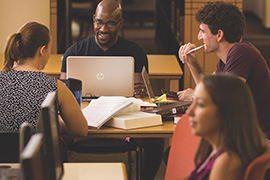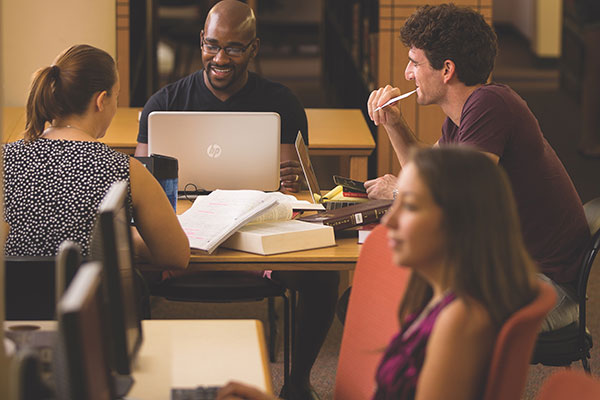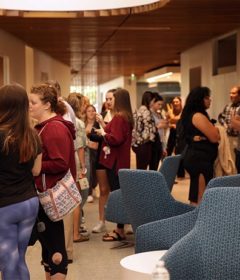Raising the Bar on Research


When people think of university research projects, they tend to envision physics or biology professors in lab coats working with test tubes, Petri dishes and Bunsen burners. The reality, however, suggests a broader scope of research of which most casual observers are not aware. At Stetson University College of Law dedicated professors, distinguished scholars and willing collaborators are conducting groundbreaking and insightful legal research.
Here are two examples.
Eyes Reveal Keys to Persuasive Writing
Catherine Cameron, professor of legal skills, who co-wrote the book The Science Behind the Art of Legal Writing, is currently heading up a research project in which she is using state-of-the-art eye tracking software to detect if there are any differences in how law students read legal opinions over the course of their education. Her goal is to collect enough data to determine whether becoming more legal-savvy leads to a better understanding of what parts of legal documents are more critical than others.
The eye-tracking software identifies where a student’s eyes move as he or she reads through a legal opinion.
“By gathering this information, we hope to better understand how successful readers of law actually do it,” explains Cameron. “If we can discover trends in reading law documents, we can learn what to present and how to present it in order to become more persuasive legal writers.”
“Being able to frame thoughts successfully in legal documents represents an important skill set for an attorney,” says third-year Stetson law student and research assistant Giovanni Giarratana. “I believe Professor Cameron’s research will establish this area of study as worthwhile of further inquiry. She’s combining empirical research and the law, which makes this both unique and exciting.”
“By engaging in these research projects, it benefits both students and professors,” says Cameron. “Anytime you increase your understanding of how something works, whether it’s the legal process as a whole or how the mind processes legal documents and language, you automatically become better at your craft.”
Human Rights Expertise from Afar
Students like Giarratana are not only benefitting from this research, but in the case of Fulbright Scholar-in-Residence Phillip Kasaija, Ph.D., they are also being exposed to a world-renowned expert on conflicts in Africa and international human rights law who brings with him years of experience. Kasaija is an associate professor of political science at Makerere University in Uganda and came to Stetson as part of a collaboration with the University of South Florida and the Florida Holocaust Museum. His expertise on genocide and post-genocide reconstruction and reparations has proved invaluable to the Stetson law community.
“Experts on conflicts in Africa and international human rights law are hard to find,” says Ann Piccard, J.D., professor of legal skills at Stetson, who has been working with Kasaija since he arrived in January. “Having an expert of his stature here, teaching and lecturing our students, represents both a great honor and a coup for us.”
During his residence at Stetson, Kasaija is researching and writing about the international law implications of the use of drones by U.N. peacekeeping forces. He also is sharing his experiences and expertise through his teaching and guest lectures.
“Dr. Kasaija was personally involved in overseeing due process in the post-genocide reconstruction in Rwanda,” says Piccard. “This provides a priceless opportunity for our students to hear firsthand accounts from an African academic whose research is personal as well as professional.”
By Jack Roth
Note: This article originally appeared in the Spring 2016 issue of Stetson University Magazine. To read the entire magazine, click here. The next issue of the magazine is scheduled for publication this fall.



